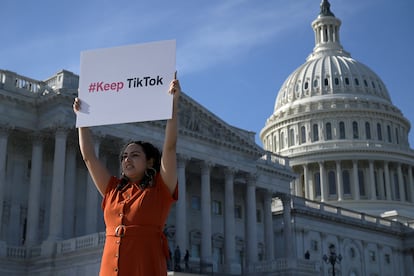House of Representatives defies China with threat to ban TikTok
The bill, supported by Republicans and Democrats and which now faces the Senate, would force ByteDance, the company that owns the Chinese video social network, to divest its stakes


The U.S. House of Representatives on Wednesday ordered a halt to TikTok dancing in the United States if ByteDance, the company that owns the Chinese video social network, does not agree to sell its stakes in the company. The bill, which could lead to a nationwide ban on the platform, was backed by a vast majority of the House, with support coming from both sides of the aisle: 352 voted in favor and 65 against (15 Republicans and 50 Democrats).
Congress’ challenge to China comes amid growing tensions between Washington and Beijing over control of technology and fears that the social media platform could threaten national security and be used for espionage or manipulation of public opinion. China, through Foreign Ministry spokesman Wang Wenbin, has warned that it would take a ban on TikTok as an act of “bullying.”
The fate of the bill, which the House fast-tracked Wednesday with little floor debate, is uncertain. It will have to be passed in the Senate, where a qualified majority of 60 out of 100 is required and where previous initiatives to curb TikTok failed to make it through. Such a resounding vote in the House of Representatives nevertheless puts pressure on senators to support a measure that is certainly unpopular among the platform’s 170 million U.S. users (more than half the country) and which is strongly opposed by young people.
Senate Majority Leader Chuck Schumer, Democrat of New York, has not yet committed to bringing the bill to the floor for a vote, and several lawmakers have already warned that they want to hold hearings on the issue before making a decision. They have also expressed concern that the ban would amount to an infringement of First Amendment rights.
“Apps like TikTok allow the Chinese Communist Party to push harmful content to our youth and engage in malign activities, such as harvesting the location, purchasing habits, contacts, and sensitive data of Americans. Today’s bipartisan vote [...] demonstrates Congress’ opposition to Communist China’s attempts to spy on and manipulate Americans and signals our resolve to deter our enemies. I urge the Senate to pass this bill and send it to the President so he can sign the bill into law,” House Speaker Mike Johnson shared on X.
Biden, willing to sign it
President Joe Biden has said that if such a bill comes across his desk, he will not exercise his presidential power to veto it and will sign it — a move that could anger young voters ahead of the November elections. Interestingly, his campaign has been using the app for his re-election campaign.
If the bill is passed and signed by Biden, ByteDance would have six months to sell TikTok. If not, the video platform would eventually be banned in the United States. Lawmakers, who received classified information Tuesday in a closed-door session about the risks the platform poses to national security, fear that China will exercise its prerogative to force ByteDance to share TikTok user data, which could be used to identify sensitive intelligence targets or to mount disinformation campaigns that could influence elections. At a Senate hearing Monday, FBI Director Christopher Wray and Avril Haines of the CIA agreed that those threats were “real.”
U.S. National Security Advisor Jake Sullivan, for his part, asked Tuesday: “Do we want TikTok, as a platform, to be owned by an American company or owned by China? Do we want the data from TikTok — children’s data, adults’ data — to be going, to be staying here in America or going to China?”
Attempts to curb TikTok in the United States date back to the Donald Trump administration, which used several executive orders to try to force app stores not to offer it and thus force ByteDance to divest their stakes. The initiative, halted in court, did not prosper, but it forced negotiations — still ongoing — between Washington and the social platform, which partly gave in to the pressure and agreed to store U.S. user data on servers controlled by the technology giant Oracle.

Nevertheless, on Monday Trump appeared to have changed his mind and urged Republican representatives to vote against the ban. In an interview on CNBC, Trump said banning TikTok would make young people “go crazy,” and warned that it would help competitor Meta, owner of Facebook, WhatsApp and Instagram, which the former president called “the enemy of the people.” Despite his fierce influence over the Republican Party, the bill was passed.
Following Wednesday’s vote, TikTok released a statement calling the measure an attack on free speech in the U.S. and criticizing the bill’s fast-tracked, closed-door passage. “We are hopeful that the Senate will consider the facts, listen to their constituents, and realize the impact on the economy — seven million small businesses — and the 170 million Americans who use our service,” the statement said.
The use of TikTok has been restricted on the phones and tablets of government officials in several countries, citing national security concerns. In addition to the United States, the United Kingdom, Belgium, Canada and New Zealand have adopted similar measures. It also cannot be downloaded by employees of the European Commission and Council and NATO.
The very idea that the hugely popular video platform could disappear prompted many Americans to call their representatives in recent days to try to convince them of the importance of TikTok, a social network where they connect with other users, get information and news, entertain themselves, do business and which has also become a source of revenue for thousands of content creators. Legislators also received pressure before the vote through the video social network itself.
Sign up for our weekly newsletter to get more English-language news coverage from EL PAÍS USA Edition
Tu suscripción se está usando en otro dispositivo
¿Quieres añadir otro usuario a tu suscripción?
Si continúas leyendo en este dispositivo, no se podrá leer en el otro.
FlechaTu suscripción se está usando en otro dispositivo y solo puedes acceder a EL PAÍS desde un dispositivo a la vez.
Si quieres compartir tu cuenta, cambia tu suscripción a la modalidad Premium, así podrás añadir otro usuario. Cada uno accederá con su propia cuenta de email, lo que os permitirá personalizar vuestra experiencia en EL PAÍS.
¿Tienes una suscripción de empresa? Accede aquí para contratar más cuentas.
En el caso de no saber quién está usando tu cuenta, te recomendamos cambiar tu contraseña aquí.
Si decides continuar compartiendo tu cuenta, este mensaje se mostrará en tu dispositivo y en el de la otra persona que está usando tu cuenta de forma indefinida, afectando a tu experiencia de lectura. Puedes consultar aquí los términos y condiciones de la suscripción digital.








































